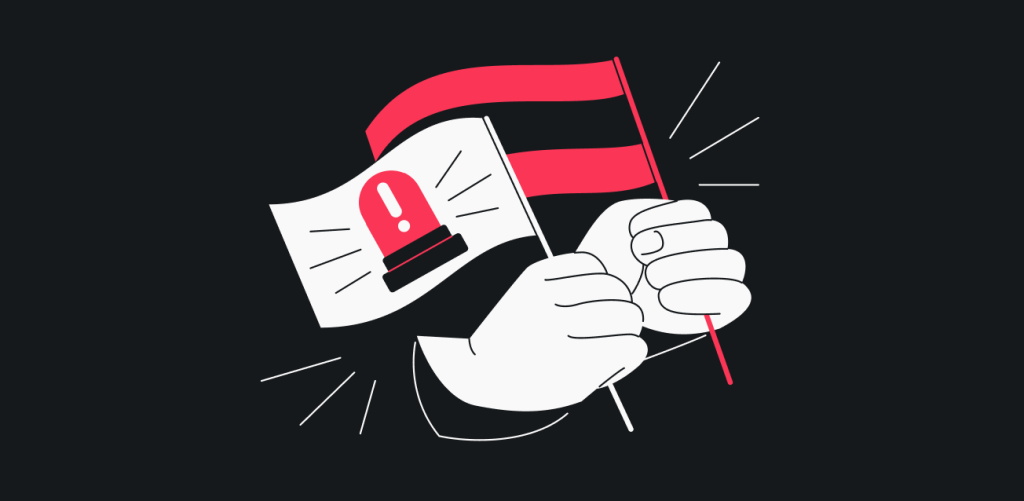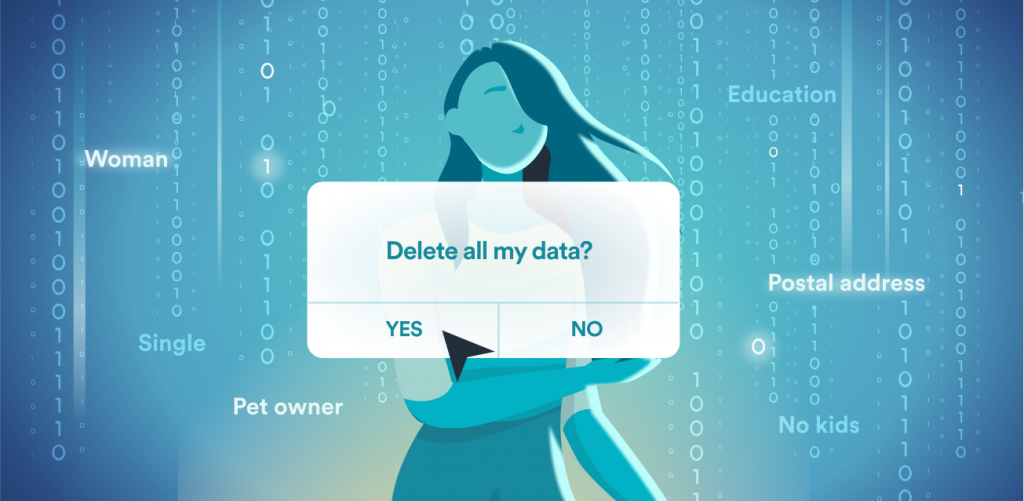The plague turned out to be the hottest, steamiest time for dating apps: Tinder witnessed a record 3 billion swipes a day in March 2020, OkCupid saw a 700% increase in dates, and Bumble hosted 70% more video calls. But as you put your personal information into the app with the hopes of finding a perfect fit, more than potential dates are watching. The dating app itself craves your data. With that in mind, we went out to discover the most data-hungry dating apps.
- The three most data-hungry apps globally are: Badoo, Bumble and HER.
- 25 out of 50 apps collect sensitive information (such as racial or ethnic data, sexual orientation, pregnancy or childbirth information, disability, religious or philosophical beliefs, trade union membership, political opinion, genetic information, or biometric data).
- More than 50% of analyzed apps use data for third-party advertising.
- On average, dating apps collect 13 data points. 46% of analyzed apps collect more than the average amount of data points.
Mapping out the most popular dating apps
To set the stage, let’s look at what dating apps the world has swiped right to. Tinder, Bumble, Badoo, and Grindr may be household names by this point, but here are their positions by downloads:
Tinder is in 1st or 2nd place in 40 out of 60 analyzed countries, while Badoo shares the top spot with its competitor in 21 nations. Bumble is well-liked in 10 out of 60 analyzed countries and thus lands at the #3 spot.
This bears remembering because two of the most popular dating apps are throwing up red flags faster than a first date that’s already talking about marriage: they rank as two of the most data-hungry dating tracking apps.
Most and least data-hungry dating apps and the information they collect
Now, before we can decide which apps might deserve to be Bye Felipe’d off your phone, we’ll explain our methods.
We compared a total of 50 of the most downloaded dating apps worldwide based on their privacy policies on the Apple Store. (Disclaimer: apps from the Google play store might have different privacy settings).
But not all data is the same when it comes to violating privacy. That’s why we developed a point rating based on invasiveness:
1 point: Data not linked to a user – data points that don’t necessarily point at a specific user (such as app crash data).
2 points: Data linked to a user – information that can identify a specific user (such as a name).
3 points: Data used to track users – data that may be used to track users across apps and websites owned by other companies (such as User ID).
An additional 20% were added if the company used collected data for third-party advertising.
Apps were ranked by the index value in descending order:
The top 3 most data-hungry apps are:
- Badoo (80.4 points), the self-proclaimed “honest dating app,” collects 23 out of 32 possible data points. 8 of them allow the app to track users across platforms: email addresses, other user contact info, precise and coarse location, device ID, advertising data, and so on. Some of this information is also used for third-party advertising.
- Bumble (67.2 points), an app which allows only women to make the first move, collects 22 out of 32 data points. It tracks 4 of them – email addresses, coarse location, device ID, and advertising data. However, it seems to use only the broadly identified “Other data types” section for third-party advertising.
- HER (67.2 points), a lesbian LGBTQ+ dating and chat app, collects 18 out of 32 data points. The tracked data points are similar to Badoo and Bumble but additionally include user IDs and phone numbers. The app uses email addresses, names, location and purchase history for third-party advertising.
Grindr and Hilly collect a relatively high amount of data. However, they collect less data that can be used to track you when compared to HER, LOVOO, and others that collect less in general. That’s why they rank lower in the data sensitivity index. On the other hand, Little Love (小恩爱) uses 8 out of the 9 data points it gathers to track you, and all of the data is linked to the user.
While being the most eligible bachelorapp in the world, Tinder tracks users less than its competitors Bumble and Badoo, thus scoring only 38.4. But that’s not all great as it still provides data to third-party advertisers.
Now, the talk about abstract data points is fine and dandy, but similarly to how you’d love to know whether potential dates’ interest in “music” includes Nickelback, you probably want to know what actual types of data the apps collect. Here’s a chart:
Bumble, Badoo and Grindr are the only apps that collect health data. Grindr even collects especially sensitive medical information, such as HIV status/last tested date, whereas Bumble and Badoo store users’ fitness data.
Health data may include data from Apple’s own Clinical Health Records, HealthKit, Movement Disorder functionalities, health-related human subject research, and any other health or medical data provided by the user.
Fitness data might refer to fitness and exercise data, both user-reported and drawn from Apple’s Motion and Fitness functionality.
The need to collect and who cares about your browsing history: interesting insights from the analysis
Just like the friends you asked to look at the potential date’s profile, we derived quite a few insights from the research. For example, on average, dating apps collect 13 data points. However, 46% of analyzed apps gather an above-average amount of data, meaning that there’s a consistent curve to excessive data collection rather than a few bad apples skewing the data.
Additionally, 25 out of 50 apps collect sensitive information, such as:
- racial or ethnic data
- sexual orientation
- pregnancy or childbirth information
- disability
- religious or philosophical beliefs
- trade union membership
- political opinion
- genetic information
- biometric data.
No apps collect physical addresses (phew), while 12 out of 50 apps do not collect any contact information. This can be taken as proof that no, dating apps don’t need excessive data collection to function.
Of all the apps, Happn is the one weirdo that collects browsing history. So yes, it potentially knows that you’re still looking at your ex’s Instagram!
What does this data collection mean to you?
Dating apps and obsessive infatuations collect data on you for very different reasons. For the free apps, it’s a way to generate income through targeted ads and marketing campaigns. 27 out of 50 (more than 50%) analyzed apps used data for third-party advertising.
Location, usage data, identifiers, purchase history, are all useful for marketers. But even then, Wink shares surprisingly identifiable data with third-party advertisers: this means phone numbers and email addresses. HER does the same with the email address, name, location, and purchase history.
However, some dating apps may use your data for purposes or parties that are not specified in their data privacy policies. Just at the end of 2021, Grindr, a location-based dating app aimed at the LGBTQ community, was fined €6.5m (£5.5m) for selling user data to advertisers.
The Norwegian Data Protection Authority said that sharing such data without seeking explicit consent broke GDPR rules. They shared GPS locations, IP addresses, advertising IDs, ages, genders, and also the fact that the users in question were on Grindr in the first place. Users could be identified through the data shared, and the recipients could potentially further share the data with data brokers, who’d resell it to more recipients.
Moreover, dating apps are not immune to data breaches and exploratory bugs. In January 2021, a well-known hacker leaked the details of more than 2.28 million users registered on MeetMindful.com, a dating website founded in 2014. Some of the most sensitive data points leaked included real names, address details, body details, dating preferences, marital status, latitude and longitude, IPs, hashed account passwords, and even Facebook user IDs with authentication tokens.
Surfshark offers two solutions for these issues. If you want to tackle quasi-legal data sharing, Incogni is a service that will submit and handle data deletion requests for data brokerage companies on your behalf. Meanwhile, Surfshark Alert will monitor known and newly discovered data breach caches for your sensitive data, allowing you to react faster and shield yourself from harm.
Informed and ready for love
Opening yourself to another person is the only way to create a meaningful intimate connection – and that already means making yourself vulnerable. No need to add to that vulnerability by also giving over your sensitive information to a dating app that may not have your best interests at heart. So take a look at this data, decide whether you need to ditch your app for a less toxic one, and return some intimacy to your dating game.
Methodology
We compared data collected from the 50 most popular dating apps on the Apple store according to the APPMAGIC platform (2022-01) based on the 32 types of data that the Apple Store lists. Apps from the Google Play Store might have different privacy settings. Information on collected data points is specified by app developers on the Apple Store.
For the full research material behind this study, feel free to visit here.


